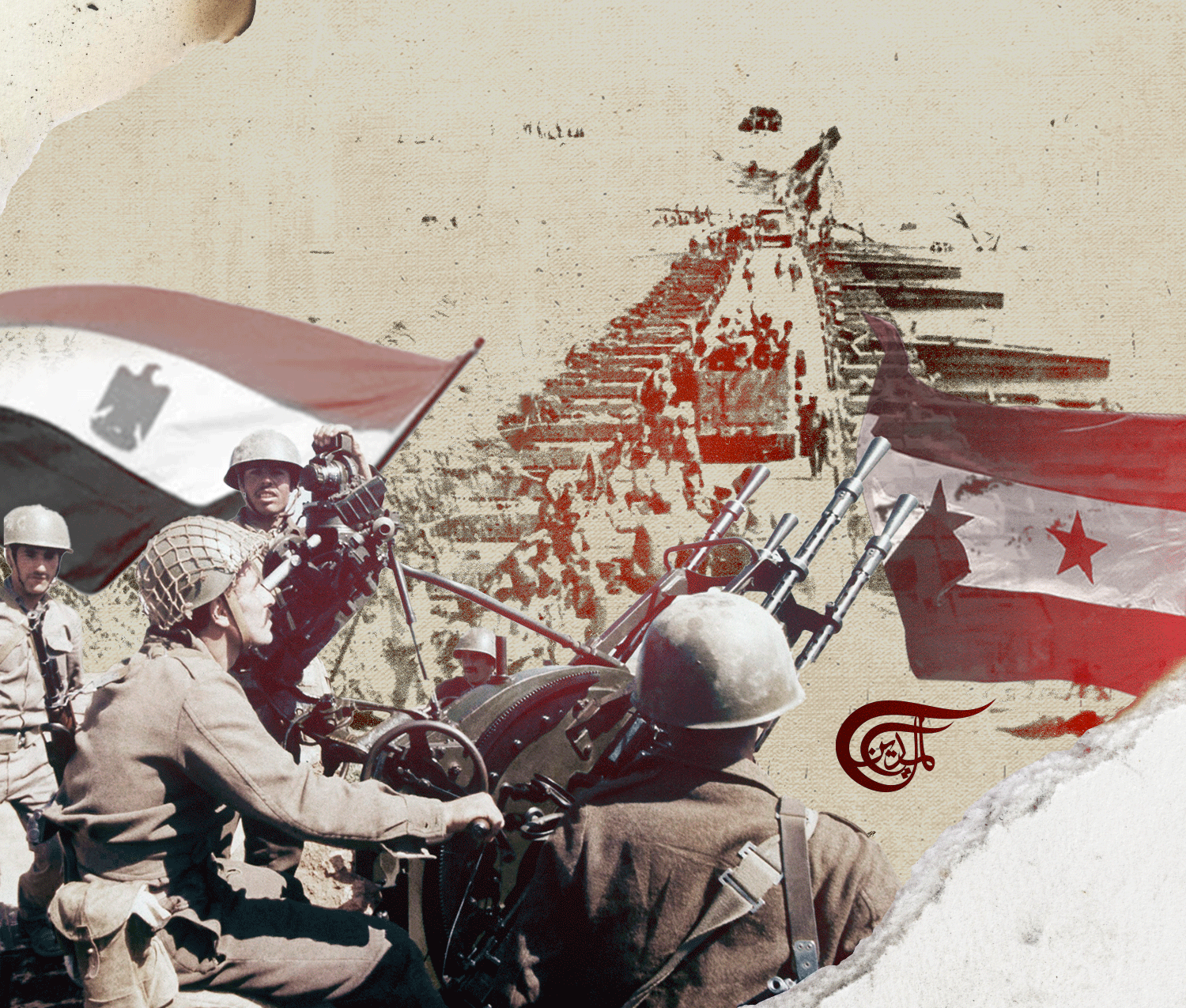How Was the Aftermath of the October War Responsible for Continued Resistance and Normalization Deals?
Although the 1973 conflict did not result in the recapturing of the territories occupied by the Zionist regime in 1967, the war did result in a number of significant achievements.
-

Compilation of photos from October 1973 Liberation War (illustrated by: Mahdi Rtail, Al Mayadeen English)
It has now been 50 years since the beginning of the October War of 1973, a conflict that in its aftermath has delivered countless lessons to the Arab World. This conflict demonstrated the power harnesses through a unification of the fronts against the Zionist Entity but also resulted in the beginning of Arab normalization ties with Israelis on a leadership level. The lessons that can be drawn from the conflict still have much relevance today.
When Syrian President Hafez al-Assad and his Egyptian counterpart, Anwar Sadat, launched their joint war that was aimed at recovering their territories captured by “Israel” in the June 1967 war, the initial results were astounding. What they demonstrated, within hours, was that using the element of surprise, combined with a coordinated effort from North to South, the Israeli occupation army could be pushed back from key territorial sticking points. Despite the image that had been promoted, depicting the Zionist army as an unstoppable arm of their much more powerful US allies, the initial victories won by the Syrian and Egyptian militaries, proved that even with superior weapons systems the Tsahal was a beatable military power.
Demonstrating the winnability of a conflict with the Zionist regime was a major victory that was extracted from the war, but what was much greater was the power of perception that was won. In proving that the Israelis were beatable, the Syrian and Egyptian soldiers, working together with their Palestinian allies, dismantled the highly valued Israeli “deterrence capacity”. "Tel Aviv’s" “deterrence capacity”, which they still claim to maintain today, is entirely based upon projecting the image of power and instilling fear in their opposition [the people and governments of the region].
In the previous Arab-Israeli wars, the Zionist forces had significant advantages that enabled them to maintain the projection of their so-called insurmountable military might. In 1948, the Palestinian resistance was all but shattered following the defeat of the Arab Revolt to the British Army by 1939, and around half of 800,000 Palestinians ethnically cleansed from their lands, were already expelled prior to the Arab World’s declaration of war in 1948. Even when the Arab armies managed to muster the might to send fighting forces, the only nations that stood a chance were Jordan and to a lesser extent Egypt. In 1956, the attack on Egypt had failed, but the initial Israeli success had come with the aid of Britain and France. As for 1967, not only were the Arab nations ill-prepared, but the Israeli military almost completely destroyed the Egyptian air force - with ‘Operation Focus’ - within minutes of the war's initiation; due to an unjustified surprise attack.
A Shift in Perspective
Although the 1973 conflict did not result in the recapturing of the territories occupied by the Zionist regime in 1967, the war did result in a number of significant achievements. One of them was the impact that the war had on Israelis themselves, whose military lost more soldiers proportionate to the population than Syria and Egypt had, despite the overall death toll being lower. Then Israeli security minister, Moshe Dayan, had upheld an unrivaled public persona on the issue of security. Considered to be the man for the job, “Mr. Security” and the guardian of “Israel”, the joint attack from Syria and Egypt transformed him into the enemy of the Zionist public and forced him to resign from his position in the office.
The US decision to provide their Israeli allies with military aid is accepted to have been the decisive factor in the Zionist military’s ability to restore the occupied territories that were temporarily liberated by the Arab armies. In reaction to the US decision, the Organization of Petroleum Exporting Countries (OPEC) announced that they were imposing an embargo on the United States. Another interesting element is to be noted: When the Israeli military was on the offensive and allegedly sought to reach Damascus, surrounding Arab nations, most prominently Iraq, sent their own armed forces to prevent this from occurring and to hold off the Zionist onslaught. There is still debate as to how much the OPEC embargo actually made an impact, but what is important here is that this was an era when the Arab Nations at least publicly maintained a unified stance. The Israelis on the other hand were saved by the US, and their ideas about their own military dominance were for many temporarily shattered.
The other elephant in the room here, is the behavior of Egyptian President, Anwar Sadat, who had attempted to approach Israeli Prime Minister Golda Meir, with a normalization proposal in exchange for the return of the occupied Sinai, only 6 months into his holding of office. Due to his failure to follow through “with the proposed strategy that was agreed secretly between himself and Hafez al-Assad”, the unity of the fronts was lost. While Syria followed the war up with the continuation of the ‘Three No’s Resolution’ that was adopted by the Arab League in Khartoum, first in 1967, the Egyptian leadership pursued an entirely different path.
There are two important lessons that can be taken from the Egyptian-Syrian split that occurred. While Anwar Sadat pursued a deal under which he secured billions in US foreign aid, a normalization of ties with the Zionist regime, and the return of the Sinai, he set the region of course for the complete division of the Arab World and abandoned the strategy of strength which had the potential to solve all the regions territorial disputes with the Israelis; including the Palestinians. By agreeing to normalization, while the entire region broke off diplomatic relations and refused to attend any meeting to find common ground, Sadat set the stage for the disastrous consequences of the Oslo Accords, in addition to the normalization trend that spread to Jordan and more recently to the Arabian Peninsula, Morocco, and Sudan.
However, Egypt could have never secured the deal it did, under the auspices of US President Jimmy Carter, without the stern message that was sent in the October War. What the conflict proved, is that when "Israel" is faced with a unified military challenge from multiple fronts, one that could threaten its very survival, it is forced into making concessions that it otherwise would never maintain. This lesson is something that may not be possible in the form of a united set of Arab countries in the current era but is manifesting itself in the unification of Arab movements and parties that currently encircle the Zionist regime. The obvious addition to the equation in 2023, is the Islamic Republic of Iran, which is aiding the Arab resistance groups across the region to achieve a unified equation of deterrence and ultimately, putting together a strategy that will impose a regional war in the event that the Zionists go too far against any of the fronts. While in the past, Arab nations were unified in their opposition, at least publicly, to the Zionist regime, today the means of confronting the Israelis is through the various Palestinian, Lebanese, Syrian, Iraqi, Yemeni, and other Arab movements, militaries, and parties. One advantage that the armed group approach has, versus the approach of countries, is that they are not severely impacted by the constraints that traditional governments have and so possess a great ability to function for the purpose of liberating territory.
The October War is considered to be the fourth and last Arab-Israeli war. It is no coincidence that since then there has been no attack by "Israel" on multiple Arab nations leading to a fifth war, this is because the result of such a conflict will be devastating for the Israelis. Although the Zionists invaded and even occupied Southern Lebanon, while continuing to launch unprovoked strikes across the region, the new equation that was set is clear. Following this, both the Palestinian and Lebanese resistance made it unbearable for the continuation of the occupation's maintenance in Southern Lebanon and the Gaza Strip; this was done through the establishment of another updated equation. As time goes on, the two major outcomes of the October War continue to develop; the continuation of the Normalization trend and the continued liquidation of Israeli deterrence. This has brought us to the predicament that the region now faces today, which led from the split created in the aftermath of the October War, where the armed resistance now competes on a separate axis from the Arab normalizers.

 Robert Inlakesh
Robert Inlakesh
 8 Min Read
8 Min Read











